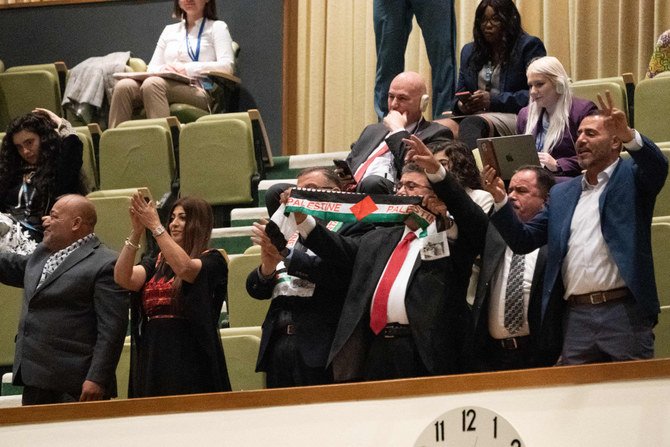Israel is deliberately impeding progress toward a two-state solution and can no longer be considered a reliable partner in the peace process, Palestinian President Mahmoud Abbas told the UN on Friday.
Israel had acted with “total impunity” against people in the Gaza Strip and the West Bank, and Palestinians’ trust in the prospects for peace was “regressing,” he said.
“(Israel) is, through its premeditated and deliberate policies, destroying the two-state solution,” the Palestinian Authority president said in a speech to the UN General Assembly.
“This proves unequivocally that Israel does not believe in peace. Therefore, we no longer have an Israeli partner to whom we can talk.”
Many Palestinians told Arab News that Abbas was frank, straightforward and direct in his diagnosis of the suffering of Palestinians.
Walid Masharqa from Jenin said he was satisfied with Abbas’ speech, which “conveyed the message of the suffering of the Palestinian people due to the policies of the Israeli occupation.”
He added: “I did not expect from the president more than that. When he gives a yearlong deadline to end the Israeli occupation and threatens to dissolve the Palestinian Authority and stop security coordination with Israel, he uses that as a means to put pressure on Israel.”
Twelve months ago, Abbas addressed the UN by video link and said he was giving Israel one year to withdraw from occupied territory or he would no long recognize the Jewish state based on pre-1967 borders. He did not mention that ultimatum on Friday, but focused instead on the lack of international recognition of the Palestinian territories.
Nasser Odeh from the village of Arora, north of Ramallah, told Arab News: “What power does President Abbas have other than receiving the world’s sympathy for the suffering of the Palestinians? The Palestinians do not have the slightest means to put pressure on the US and European countries.”
He also underlined the world’s bias in favor of Israel.
“The biggest threat to Israel is Abbas’ decision to dissolve the PA, but does dissolving the authority benefit the Palestinian cause and serve the Palestinian citizen? The PA, despite all its shortcomings, is a demand of the Palestinian people, and Abbas’ program remains better than that of his political opponents, especially Hamas,” Odeh added.
Palestinian political analyst Ghassan Al-Khatib told Arab News that he did not follow Abbas’ speech because he knew in advance that he would not say anything new.
Basem Naim, head of the Hamas political department in Gaza, said Abbas spoke logically and sensibly.
“Still, his words did not reflect a shift in his attitude toward the Palestinian-Israeli conflict. He will not take decisions such as stopping security coordination with the Israeli occupation, improving relations with Palestinian factions, ending the Palestinian division, withdrawing recognition of Israel and holding general elections in the Palestinian Territories,” he said.
“As long as Abbas’ words are not translated into action, they will remain just media news for 24 hours. Israel will not change its position on the PA based on Abbas’ speech.
“Therefore, they should reconsider their relationship with Israel and the US, and implement the decisions of the Palestine Liberation Organization, which demanded the withdrawal of recognition of Israel and the cessation of security coordination with it,” Naim added.
Ahmed Ghuneim from the Fatah movement in East Jerusalem told Arab News that he was expecting Abbas’ speech to mention last year’s ultimatum to Israel, “but he never spoke about it.”
“He did not tell the Palestinians what they were waiting to know, namely what will Abbas do after the expiration of the deadline,” he said.
Ghuneim added that the president’s speech reflected the extent of Abbas’ frustration and despair.
He criticized him for “selling grief and begging instead of taking courageous and daring decisions that could embarrass Israel before the world.”
Israel has occupied East Jerusalem and the West Bank since 1967, and since 2007 has imposed a blockade on the Gaza Strip, a Palestinian territory controlled by the Islamists of Hamas.

